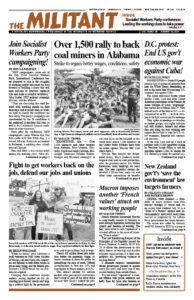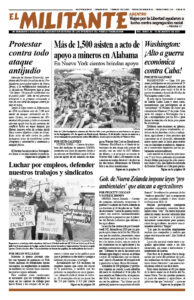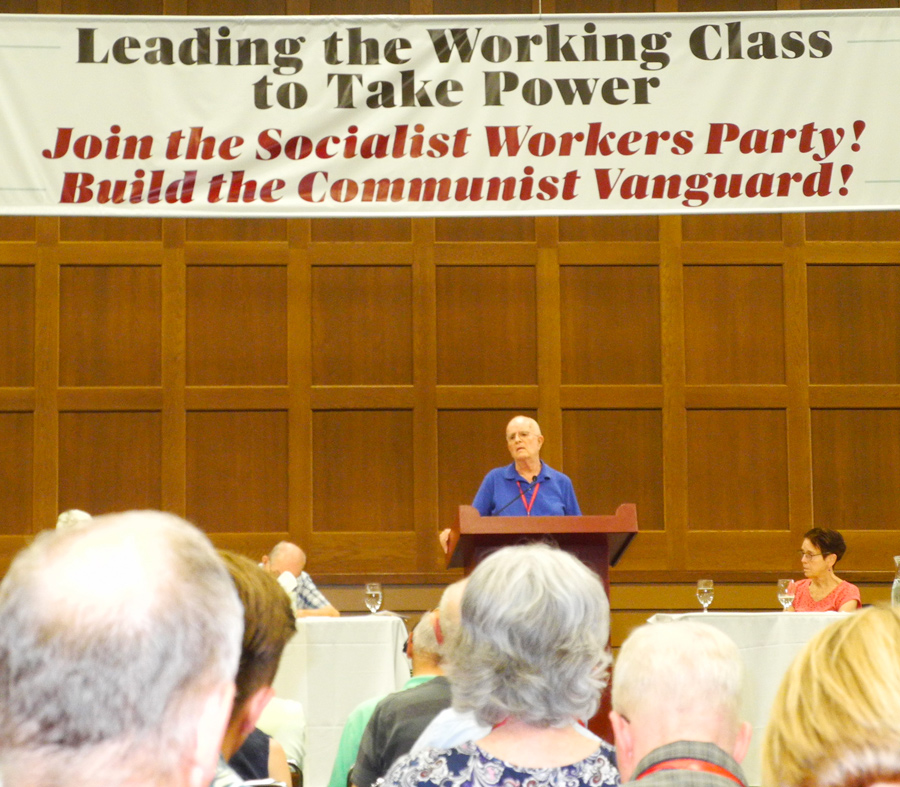SPRINGFIELD, Ohio — “This is a book about the dictatorship of capital and the road to the dictatorship of the proletariat,” Socialist Workers Party National Secretary Jack Barnes said, pointing to Malcolm X, Black Liberation, and the Road to Workers Power.
Speaking at the SWP international conference held at Wittenberg University here July 22-24, Barnes added, “It is a book about why this revolutionary conquest of state power by a politically class-conscious and organized vanguard of the working class — millions strong — is necessary.”
“Political power doesn’t simply fall into the hands of the working class and its allies,” Barnes emphasized. “It has to be taken.” This requires building a communist party. At stake is whether working people can act decisively to take power as the crisis of capitalism deepens, and to prevent fascist forces unleashed by an increasingly desperate ruling class from crushing us, with devastating consequences for humanity. This is the party we are striving to build today and in the social and political struggles that lie ahead.
The banner hanging above the conference stage summed this up: “Leading the Working Class to Take Power,” “Join the Socialist Workers Party! Build the Communist Vanguard!”
These themes marked the three main talks at the conference, a series of classes intended to deepen the discussion, conference summaries that concluded the gathering, and a spirited session at the end entitled, “Taking Our Communist Program to the Toilers.”
Three hundred thirteen people attended the conference, including members and supporters of the communist movement in Canada, France, Greece and the United Kingdom. A good many more would have come if government travel bans in Australia, New Zealand, the U.K. and the U.S. had been lifted.
Socialist revolution, Marxist leadership
In his opening political report to the conference, Barnes pointed to the 1917 Russian Revolution and the 1959 Cuban Revolution, the two great socialist revolutions of the imperialist epoch, and the decisive leadership that led them to power — the Bolshevik Party in Russia and the July 26 Movement in Cuba.

Displays highlighting the conference themes and the SWP’s continuity were set up along the side of the meeting hall, beginning with six panels entitled, “The Cuban Revolution — A Socialist Revolution with a Marxist Leadership.” The display highlights Barnes’ editing of the introduction to a Militant article to ensure it clearly presented how the socialist revolution unfolded in Cuba. Workers and farmers in Cuba were not only led to take power and make ever-deeper inroads against capitalist exploitation and property relations, Barnes added, but through their own experiences to “recognize the socialist character of these accomplishments and the Marxist politics of their leadership and thus transform themselves in the process.”
“Unless that truth is told,” Barnes added in his conference summary, it has no meaning. Socialist revolutions can only be led by parties that have been built and steeled in struggle beforehand. Their members are imbued with the program, the courage and audacity needed to lead millions to take power when it becomes both possible and essential in order to prevent the triumph of reaction.
Based on the conclusions Karl Marx and Frederick Engels drew from the Paris Commune — the first workers and farmers government ever established — Lenin built the Bolshevik Party in Russia to lead workers to take state power when the time came, Barnes said. Lenin wrote State and Revolution to deepen the party’s preparation for these decisive moments. He urged party leaders in Russia to make sure it was printed if anything should happen to him.
Joseph Hansen, a longtime leader of the SWP who visited Cuba in 1960 and for years helped lead the party in understanding and defending the revolution there, explained that timely leadership is crucial. “Problems related to the struggle for power,” Hansen wrote, “cannot be placed in deep-freeze to be brought out ‘when the time comes.’”
Shift since the last conference
At the last party conference in June 2019, the banner hanging above the platform read, “Advancing Along the Line of March of the Working Class. Act on Imperialism’s Deepening Political Crisis. Build the Labor Movement. Build the Socialist Workers Party.” No one could have foreseen how today’s capitalist crisis would unfold these last two years, Barnes said, but the SWP acted on what that banner said, never missing a beat in going more deeply to the working class and dealing with challenges posed by the pandemic along the way.
While the middle-class “left” disappeared from public activity, retreating to virtual reality, the SWP campaigned widely in the working class, expanded the circulation of the Militant, built solidarity with union battles and fights against police brutality and other social struggles. The party inspired its supporters, attracted new, young fighters and stepped up attention to Marxist education. It campaigned for the unions to take the leadership in fighting for workers to get vaccinated, the only road to shutting down the pandemic.
Barnes urged participants to read what Malcolm X said about how he had to transform himself to become a revolutionary leader. A precondition for Malcolm acting on his own worth and that of other working people was turning his back forever on the life he led as an uneducated hustler, thief and pimp.
In prison, he began to read voraciously — starting with the dictionary. He worked his way though classics in literature, history, culture and the “old philosophies, Occidental and Oriental.” He cleaned himself up, realizing that if he did not do so he, known as Detroit Red, would end up dead or as “a bitter convict in some penitentiary” or “hustling, stealing enough for food and narcotics, and myself being stalked as prey by cruelly ambitious younger hustlers such as Detroit Red had been.” He wrote that his study “awoke inside me some long dormant craving to be mentally alive.” On this basis, he strove to set an example, to fight to awaken working people to their self-worth.
Barnes said, “It contributed to making Malcolm X among the most truly educated, capable revolutionary leaders to emerge in the U.S. in our lifetime.”
Refuge for Jews in imperialist epoch
The endurance of Jew-hatred in the imperialist epoch, and its use at times of crisis by the capitalist rulers to divide and crush the working class and its communist vanguard, requires the revolutionary party to champion the fight against it and unconditionally defend the right of Israel to exist today, SWP leader Dave Prince said in the second major conference presentation. It was entitled, “For Unconditional Recognition of Israel as a Refuge for Jews in the Imperialist Epoch: The Stakes for the World Working Class.”
The establishment of Israel in 1948 became inevitable after the Nazi’s extermination of 6 million Jews during World War II; the refusal of the U.S. and U.K. imperialist democracies to open their borders to Jews before, during and after the Holocaust; and the betrayal of revolutions by Stalinist parties in the 1930s as in Spain, and in immediate postwar years in Greece and elsewhere.
“A victorious Spanish proletarian revolution would have stayed the hand of imperialism, stopped the second imperialist slaughter, inspired the world working class, and rearmed German workers and their allies to defeat the fascist regime,” Prince said.
Instead, the Stalinist treacheries prevented governments of working people from coming to power that could have charted a course toward eradicating antisemitism once and for all.
The battle to rid the world of anti-Semitic violence is an integral part of the working-class struggle to take power.
Throughout the 20th century, the communist movement strongly opposed the Zionist movement, which advocated Jews should leave the countries where they were born and establish settlements in Palestine. The Bolshevik Party under Lenin’s leadership fought to build a revolutionary working-class party throughout the czarist empire and advocated the building of revolutionary working-class parties in the Middle East that could unite all toilers — Jewish, Arab, Kurdish, Persian and others — in the fight to overthrow imperialist domination and their own capitalist rulers.
In his book The Jewish Question, Prince said, Abram Leon correctly said the only road to eliminate Jew-hatred is for the working class to take power and carry out socialist revolutions.
But communists don’t complain when the class struggle doesn’t turn out the way they had hoped, Prince said. We recognize reality, and “we lead a way forward, through and not denying what exists.”
The existence — and necessity — of the state of Israel as a refuge for Jews has been settled by the gruesome history of capitalism and Jew-hatred in the 20th century.
For communists, fighting Jew-hatred is not “a cause,” but an inseparable part of the working class’s struggle to take power into its own hands. The primary target of fascist forces that will inevitably be spawned by capitalism in crisis is not Jews. It’s the working class and its communist vanguard. Fascism becomes the capitalist rulers’ last hope to preserve their dog-eat-dog system of exploitation and oppression. Jew-hatred, like anti-Black racism, are tools to sow terror, to mobilize reactionary forces and divide the working class, the only class capable of stopping them. If working-class defense guards don’t stop them, they’ll smash unions and crush the working class.
Historical materialism is crucial
No socialist revolution is possible without advances in working-class consciousness, a product of disciplined struggle side by side with fellow workers. Along the way, it is essential that revolutionary-minded workers acquire a scientific view of world history and the class struggle. “Without Historical Materialism There Can Be No Working-Class Unity, No Answer to ‘Wokery,’ No Revolutionary Workers Movement,” was the title of the third plenary session talk, given by SWP leader Mary-Alice Waters.
“Historical materialism is under ferocious attack today,” said Waters, “even though you may never hear that world outlook — one of the cornerstones of Marxism — mentioned by name.” The attacks are spearheaded not by the traditional centers of reaction, she added, but by privileged middle-class layers that many consider to be the “progressive” wing of liberal bourgeois democracy.
There is a concerted attempt to negate the scientific world outlook that has guided the revolutionary vanguard of the working class for 150 years and in its place to advance creation myths, fables, conspiracy theories, contempt for science and rejection of the cumulative cultural patrimony of humanity. This is what underlies much of what we know today as “culture wars,” Waters said.
“Culture wars are at bottom class wars, and they are deepening today above all because the class struggle is sharpening as the crisis of the world order brought into being by the workings of capitalism in the imperialist epoch advances — now accelerated by the COVID pandemic.”
This is the context within which communists carry out our political work today, Waters stressed, and that won’t change substantially until there are new labor struggles of a size and social weight that can demonstrate a different class road forward.
Citing Frederick Engels’ graveside tribute to Karl Marx in 1883, Waters noted, “Just as Darwin discovered the law of development of organic nature, so Marx discovered the law of development of human history: the simple fact … that mankind must first of all eat, drink, have shelter and clothing, before it can pursue politics, science, art, religion, etc.”
When Waters’ generation joined the SWP, she said, veterans of the communist movement “urged us to read and study, including works such as Engels’ The Origin of the Family, Private Property, and the State. They led us to become citizens of time and the world, to understand the ‘long view of history.’” Whatever our backgrounds, “we came to recognize and appreciate the diverse cumulative gains of humanity and to understand that communism will be built on the best of that culture.”
The New York Times 1619 Project was one of the examples of the political war on historical materialism addressed by Waters, as well as “cancel culture” and the counterrevolution on women’s rights represented by the campaign to deny the biological reality of two sexes.
The 1619 Project’s principal author, journalist Nicole Hannah-Jones, turns on its head the entire 500-year history of what is today the imperialist United States of America. At the center of her lead article she asserts the “belief, that black people were not merely enslaved but were a slave race, became the root of the endemic racism that we still cannot purge from this nation to this day.”
In other words, Waters noted, “she asserts that our history has been driven by an idea.” It has nothing to do with the fact that “the degree of economic development attained by a given people or during a given epoch form the foundation upon which the state institutions, the legal conceptions, art, and even the ideas on religion, of the people concerned have been evolved.”
Waters noted that the entire piece by Hannah-Jones is a hymn to bourgeois democracy as embodying the highest of human “ideals,” which she claims Black people believe in more than any other segment of U.S. society.
Many of the facts of U.S. history referred to by Hannah-Jones, especially the meaning of the bloody counterrevolutionary crushing of post-Civil War Radical Reconstruction, are things the Socialist Workers Party has educated working people on for decades.
“Our job,” Waters said, “is to raise the discussion to a higher level and explain the unique character of black chattel slavery in the Americas, which didn’t arise out of pre-class society. On the contrary, it was grafted onto U.S. capitalist production for the world market and became a bigger and bigger obstacle to capitalist development, which depends on free wage-labor as the basis of capitalist production.”
Capitalism is the root of “systemic racism” in the U.S., not “white supremacy.”
Classes, supporters meeting, rally
The conference classes included, “Campaigning for Solidarity and Workers Power: How Communists Run in the Elections”; “Black Liberation, the Jewish Question, and the Struggle for a Proletarian Party: Opposing Courses in Our Movement’s History”; “‘The Class Struggle Road to Negro Equality’: Our Communist Continuity”; and “The Communist Fight to End the Oppression of Native People in Canada.”
A closing rally July 24 featured SWP and Communist League candidates and other party supporters, chaired by SWP National Campaign Director John Studer and party Trade Union Director Mary Martin. Speakers described the activity that SWP members and candidates would be joining coming out of the conference, including a Washington, D.C., protest against the U.S. embargo of Cuba the next day and an Aug. 4 rally in Alabama to win support for UMWA miners on strike at Warrior Met Coal.
Between now and the November elections, SWP candidates and campaigners will take the perspectives laid out at the conference, including the need for working people to take political power into our own hands, to rural areas, towns and cities across the country. A fund appeal at the rally raised some $42,000.
The day after the conference, party supporters met to map out plans for their work organizing the production, printing and distribution of books by SWP leaders and other revolutionaries and raising funds for the work of the party.
The words of a young factory worker from Columbia, South Carolina, who joined the SWP at the conference, expressed the feelings of all those present. “I want to do something that can realistically end the horrors you see in this world, by ending the system of exploitation,” he told the Militant.


